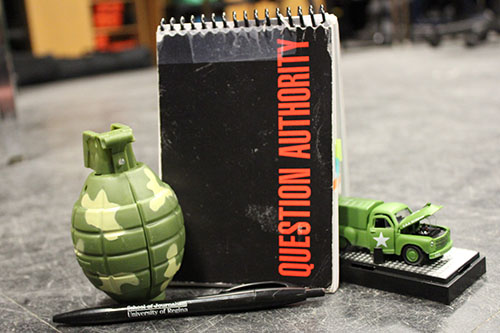Everywhere you look there are armoured trucks and soldiers dressed in green. At night you sleep on a cot, squished into a canvas tent with 19 other people. Privacy is minimal, if nonexistent.
Bergen is the designer behind a military journalism course sponsored by the U of C and the Canadian Global Affairs Institute. Journalism students across Canada in at least their third year of study are eligible to apply to this scholarship program. If accepted, they’re shipped to Calgary where Bergen packs 25 years of experience into 10 days of training.
The Canadian Journalism Military course started out of a desire to educate young journalists, and to improve the relationship between journalism and the military across the board.
This spring, 10 students will have an opportunity to study media-military theory in a hands-on certificate program that runs nine days. Training starts April 30 and ends May 10. Transportation to and from Calgary, accommodation, meals and ground transportation in Alberta are all included.
Taylor Blewett, a fourth-year journalism student at Carleton University, won a scholarship in 2016.
“This was not something you would be able to do as a regular citizen,” said Blewett. “The high point of the entire experience was our placement at the Canadian Forces base at Wainwright in Alberta.”
Wainwright is where Blewett slept in tents alongside her classmates, and where aspiring journalists have an opportunity to familiarize themselves with large equipment like military tanks and ask questions that they might otherwise never be able to.
“I absolutely loved it,” said Blewett, who sees a future for herself in this world. “I think it’s a niche beat in Canada that isn’t receiving a lot of attention. This year I’ve continued to write pieces that look at the CF and the Department of National Defence and what’s going on in that portfolio in the government and in Ottawa.”
For retired colonel Brett Boudreau, context and perspective are the most important tools military journalists can equip themselves with.
“It is unfair to criticize media and journalism when they get it wrong if nobody has tried to help them get it right,” said Col. Boudreau. “To inform your reporting you need that context and perspective that’s born out of good working relationships with people over a course of time.”
For students interested in the program, postmarked applications are due March 20.
